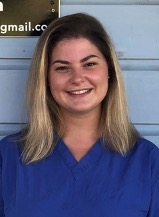
Meet the team: Dr Harriet Thornton
Can you introduce yourself and your role with COMBAT-AMR?
My name is Harriet and I am a qualified Veterinary Surgeon from the UK. Since I qualified, I have worked in clinical practice in the UK, Australia, the Cook Islands and Samoa across private and non-profit clinics treating everything from frogs and birds, to dogs, cats and livestock! More recently I have been doing private consultancy work on several projects across both animal and human health sectors.

My role with COMBAT-AMR is as a Consultant in Animal Health.
What are you currently working on?
My main role has been to develop and facilitate a program of training for the paraveterinarians workforce with the Ministry of Agriculture and Fisheries here in Samoa. Currently we are nearly half-way through our training schedule which is comprised of a series of two-day workshops combining both theory and practical elements. We are also nearly finished with developing a survey for pet owners looking at unprescribed antibiotics and how we can reduce inappropriate antibiotic use.
My job is to equip the paraveterinarians with key skills and knowledge to help them treat animals effectively and appropriately. Starting with identifying barriers to appropriate antibiotic use, we have tailormade a program addressing issues and gaps in knowledge. This has ranged from basic handling and examination skills, to more complex population medicine and herd health planning.
Before joining the COMBAT-AMR project, what were you working on?
Before joining COMBAT-AMR, I was working in Samoa as a clinical vet both in a non-profit clinic and in supporting the livestock division through the Ministry of Agriculture and Fisheries as a consultant.
I was also part of developing several animal health outreach and public education projects in rural regions.
What initially attracted you to working in animal health?
I was animal-obsessed growing up and had always wanted to be a vet! After qualifying I realised how diverse the veterinary profession was and how many opportunities there are to work in different fields. For myself, this profession has taken me all over the world in lots of different roles.
What does One Health mean to you?
One Health to me is the concept that all living beings are in some way interconnected. It is the principle of true co-operation and communication between animal and human health sectors globally to improve the health of everyone.
Why is combatting AMR important to you?
In the next 50 years AMR will be one of the largest threats to human and animal life. We take for granted that if we have an infection, antibiotics will make us better. As a clinician who prescribes many courses of antibiotics daily, I can’t imagine a world where we don’t have access to effective medications to help people and animals.
I have seen the very real impact of AMR on people and animals already, especially in developing countries.
It is important for those of us working on the frontline in clinics and hospitals to take the lead in assessing our own prescribing techniques and making sure we do everything we can to reduce unnecessary use of antibiotics.
What do you see as the biggest challenges in mitigating the threat of AMR in the Pacific Islands and globally?
For many Pacific Island Countries like Samoa, there are critical barriers for people in terms of accessing medical care and a critical shortage of qualified medical and veterinary professionals. Even maintaining a supply of medications can be a challenge at times.
Globally one of the biggest challenges in mitigating the threat of AMR is the lack of regulation in the sale and use of antibiotics. Unprescribed use of antibiotics is a major issue in both human and animal health sectors, and we must safeguard these medications for those that really need them.
We also need to address the global shortage of veterinarians and provide support to the animal health sector in developing countries through the training of local staff.

